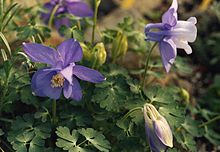Aquilegia saximontana, the Rocky Mountain columbine, alpine dwarf columbine, dwarf blue columbine, or alpine columbine, is a perennial plant that comes from the buttercup family, Ranunculaceae.
| Aquilegia saximontana | |
|---|---|

| |
| Scientific classification | |
| Kingdom: | Plantae |
| Clade: | Tracheophytes |
| Clade: | Angiosperms |
| Clade: | Eudicots |
| Order: | Ranunculales |
| Family: | Ranunculaceae |
| Genus: | Aquilegia |
| Species: | A. saximontana
|
| Binomial name | |
| Aquilegia saximontana | |
Description
editA. saximontana can be found in sub-alpine and alpine areas at elevations of 3,300–4,000 m (10,800–13,100 ft) in the Rocky Mountains. This species of columbine blooms in July and August. The blooms are lavender and white, and the entire plant reaches 5–25 cm (2.0–9.8 in) in height.[1] This plant is endemic (native only) to the Rocky Mountains in Colorado, United States.[2]
A. saximontana should not be confused with Aquilegia coerulea var. coerulea, which overlaps in range and may also have blue and white flowers. They can be identified by comparing the length of the "spur"-shaped backs of the flowers; A. saximontana has hooked spurs 3–9 mm (0.12–0.35 in) long, while A. coerulea has straight spurs 34–48 mm (1.3–1.9 in) in length.[1][3]
See also
editReferences
edit- ^ a b "Aquilegia saximontana". Efloras, FNA Vol. 3. Retrieved 2010-12-29.
- ^ USDA, NRCS (n.d.). "Aquilegia saximontana". The PLANTS Database (plants.usda.gov). Greensboro, North Carolina: National Plant Data Team.
- ^ "Aquilegia coerulea var. coerulea". Efloras, FNA Vol. 3. Retrieved 2010-12-29.
